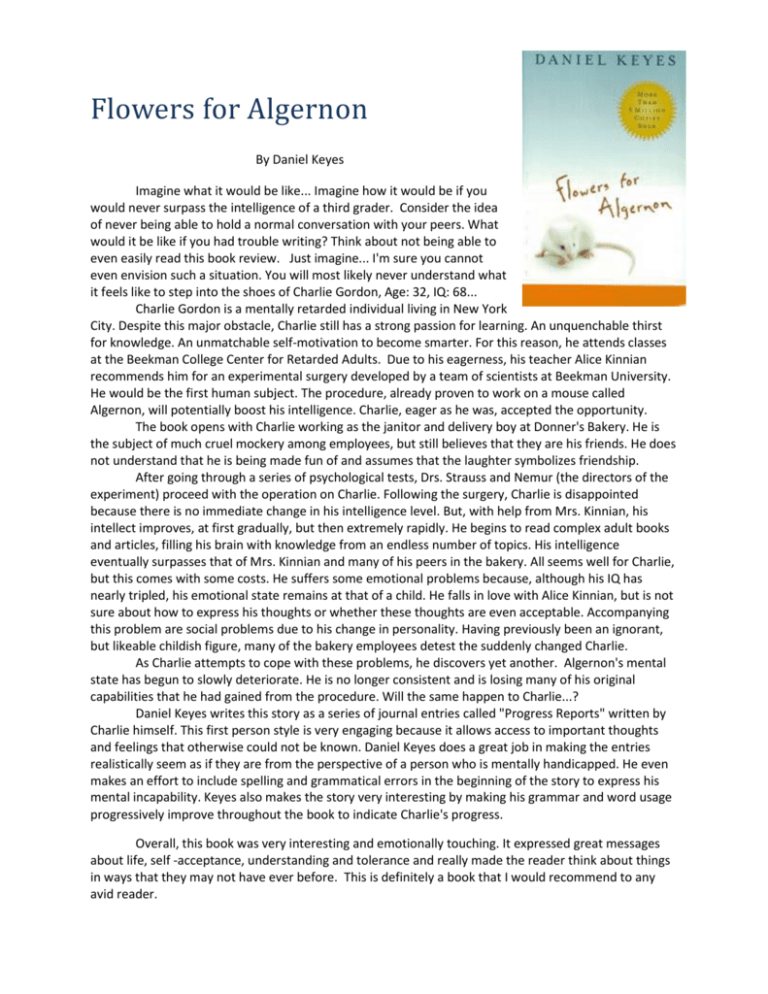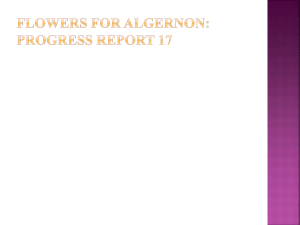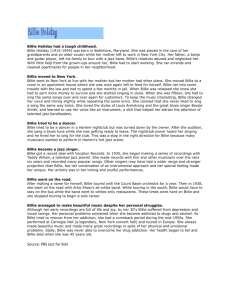Student Example Book Reviews
advertisement

Flowers for Algernon By Daniel Keyes Imagine what it would be like... Imagine how it would be if you would never surpass the intelligence of a third grader. Consider the idea of never being able to hold a normal conversation with your peers. What would it be like if you had trouble writing? Think about not being able to even easily read this book review. Just imagine... I'm sure you cannot even envision such a situation. You will most likely never understand what it feels like to step into the shoes of Charlie Gordon, Age: 32, IQ: 68... Charlie Gordon is a mentally retarded individual living in New York City. Despite this major obstacle, Charlie still has a strong passion for learning. An unquenchable thirst for knowledge. An unmatchable self-motivation to become smarter. For this reason, he attends classes at the Beekman College Center for Retarded Adults. Due to his eagerness, his teacher Alice Kinnian recommends him for an experimental surgery developed by a team of scientists at Beekman University. He would be the first human subject. The procedure, already proven to work on a mouse called Algernon, will potentially boost his intelligence. Charlie, eager as he was, accepted the opportunity. The book opens with Charlie working as the janitor and delivery boy at Donner's Bakery. He is the subject of much cruel mockery among employees, but still believes that they are his friends. He does not understand that he is being made fun of and assumes that the laughter symbolizes friendship. After going through a series of psychological tests, Drs. Strauss and Nemur (the directors of the experiment) proceed with the operation on Charlie. Following the surgery, Charlie is disappointed because there is no immediate change in his intelligence level. But, with help from Mrs. Kinnian, his intellect improves, at first gradually, but then extremely rapidly. He begins to read complex adult books and articles, filling his brain with knowledge from an endless number of topics. His intelligence eventually surpasses that of Mrs. Kinnian and many of his peers in the bakery. All seems well for Charlie, but this comes with some costs. He suffers some emotional problems because, although his IQ has nearly tripled, his emotional state remains at that of a child. He falls in love with Alice Kinnian, but is not sure about how to express his thoughts or whether these thoughts are even acceptable. Accompanying this problem are social problems due to his change in personality. Having previously been an ignorant, but likeable childish figure, many of the bakery employees detest the suddenly changed Charlie. As Charlie attempts to cope with these problems, he discovers yet another. Algernon's mental state has begun to slowly deteriorate. He is no longer consistent and is losing many of his original capabilities that he had gained from the procedure. Will the same happen to Charlie...? Daniel Keyes writes this story as a series of journal entries called "Progress Reports" written by Charlie himself. This first person style is very engaging because it allows access to important thoughts and feelings that otherwise could not be known. Daniel Keyes does a great job in making the entries realistically seem as if they are from the perspective of a person who is mentally handicapped. He even makes an effort to include spelling and grammatical errors in the beginning of the story to express his mental incapability. Keyes also makes the story very interesting by making his grammar and word usage progressively improve throughout the book to indicate Charlie's progress. Overall, this book was very interesting and emotionally touching. It expressed great messages about life, self -acceptance, understanding and tolerance and really made the reader think about things in ways that they may not have ever before. This is definitely a book that I would recommend to any avid reader. Out of the Dust By Karen Hesse The Dust Bowl. Dust. Draught. Hardship. This describes the life of 14 year-old Billie-Jo who lives in the Oklahoma Panhandle in 1935. She and her family, relying on crops in order to make a living, are struggling to make ends meet in such difficult times. All they can do is hope. Hope for their luck to improve. What can add to this horrible situation? Billie Jo's mother is anticipating the arrival of a new addition to the family. Billie Jo's father, a wheat farmer, is unable to make anything grow in the draught but refuses to give up or look for alternative methods of survival. Although Billie Jo wants to leave Oklahoma in search of a new life, her father refuses. He is in constant hope of rain and believes that one day there will be plenty of wheat to sell. In the mean time, the family can only wait. As the draught continues, Billie Jo watches her friends, neighbors and family suffer. She sees many of them leave, one way or another. The ones that stay experience tragic losses of family and crops. Her only escape from the misery is her passion for playing the piano. It allows her to get out of the dust and forget all of her problems. She is a gifted piano player and is fortunate enough to be able to travel around and perform with other prestigious musicians in the town. She often looks to her mother for support and encouragement but does not always find what she needs. Billie Jo loses all hope of life getting any better after the occurrence of a horrific incident in her family. One day, her father leaves a pail of kerosene on the stove. When her mother makes coffee, she accidentally pours the hazardous liquid thinking that it is water. This results in the start of a fire. She runs outside to get the father while a startled Billie Joe gets the flaming pail and goes to throw it outside. Unfortunately, just as she does this, her mother is walking back inside, and collides with the kerosene flames. Billie Joe immediately springs into action and tries to put out the flames. In the months that follow, Billie Jo's mother lays bed ridden and eventually dies of the burns, along with their unborn baby, Franklin. This represents a major turning point in the story as it adds to the depression in the lives of Billie Jo and her father. It also changes the relationship between them. With time, the father becomes unreachable and the distance between the two grows greater and greater. The remainder of the story deals with how they cope with the painful loss, along with the already existing hardships. Karen Hesse's unique free-verse style that she uses in this book is attention grabbing and effective. It allows for messages to be conveyed clearly and simplistically, without young adult readers being overwhelmed with a large amount of text. It also allows for free flow of emotion in the writing. Another aspect of this style that makes it ideal for such a heavy topic is that readers must pause more often when reading free-verse because of the broken up structure. This compels readers to slow down and reflect more about what they just read. This book is very realistic as it actually refers to a tragic event that happened in history. It is also very touching and conveys meaningful messages about family hardships, hope and overcoming obstacles. Readers may be able to relate to the problems that Billie Jo encounters and can learn from the story that there is always light at the end of the tunnel.










